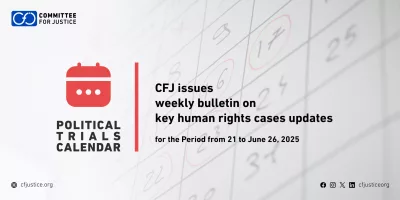News briefing
Translated and edited by: Committee for Justice
Geneva: 12 October 2021
UN experts have expressed concern about the arbitrary detention of Egyptian human rights defenders Rami Shaath and Mohamed El-Baqer, and the Egyptian Court of Cassation’s decision to include them on terrorist lists, stressing that the terrorist lists law is a matter of continuing concern for UN special procedures.
Arbitrary arrest and inclusion on terrorist lists:
In their lengthy memorandum sent to the Egyptian authorities on August 13, 2021, which has not yet been answered, the experts said that Ramy Shaath, an Egyptian-Palestinian political activist and human rights defender, participated in the establishment of many coalitions and movements advocating democracy in Egypt. He was detained twice on July 5, 2019, and on April 17, 2020, when he was added for a period of five years to the list of terrorist entities in absentia and without the presence of lawyers, in Case No. 517/2020.
The experts also added that Mohammed al-Baqer, a lawyer and human rights defender, has actively used social and other media to post and write about human rights issues, including enforced disappearances and alleged torture and the involvement of the National Security Agency in them. After his arrest in August 2019, he was arbitrarily detained for a long time, and was also included on the list of terrorist entities in Egypt in Case No. 1781/2019.
Continuing concern about the process of being listed on terrorist lists:
In their memorandum to Egypt, the experts stressed that the process of listing names on terrorist lists is a matter of continuing concern for the United Nations special procedures. This is because the inclusion of individuals on these lists does not necessarily require the presence of the accused or his defense, because it is a judicial procedure that results in mere procedures that the accused has the right to appeal.
The experts emphasized that the listing process constitutes an arbitrary, independent and severe legal penalty, which profoundly affects the civil and administrative rights of individuals, and thus requires the full rights of fair procedures under international law, including access to independent legal representation. It therefore appears to represent a systematic pattern of violations in the use of counter-terrorism legislation to suppress dissent and restrict the work of human rights defenders in Egypt.
The experts pointed out that placing individuals or groups on terrorist lists must be necessary and proportionate, and therefore only in response to an actual, distinct and measurable act of terrorism or a clear threat to commit a terrorist act, so a false and overly general interpretation of the crime of terrorism necessarily means that the requirements of necessity and proportionality are not met.
The experts further explained that placing individuals or groups on terrorist lists entails depriving them of a range of basic human rights, including freedom of movement, association, expression, right to privacy, property, health, due process, family life, social and economic rights, including the right to work, along with a wide range of severe penalties and deprivation of liberty.
The experts expressed serious concern about the lack of transparent procedural practices that prevent such interference with the inclusion of individuals and organizations, noting that efficiency, independence and impartiality in judicial review is a core tenet of the meaningful investigation of an accountable legal process, as evidenced by the case of Baqer, who was included in the context of his arbitrary detention, where he has little or no access to a lawyer.
The experts also expressed concern that the Egyptian government does not appear to be obligated to provide any detailed evidence as part of the listing process, regardless of the current charges, nor to complete adjudication of criminal charges prior to listing. Moreover, it also appears that intelligence reports are being used as evidence in proceedings, without adequate support, scrutiny, or scrutiny by independent oversight, especially since intelligence services are not subject to independent oversight in contravention of international best practices.
UN concern about the continued arbitrary detention:
The experts also expressed their deep concern about the continued arbitrary detention of Shaath and Baqer without trial, depriving them of their most basic right to a fair trial, as well as their torture in the name of combating terrorism, which appears to be linked to the exercise of their right to freedom of expression and the defense of the rights of others and their freedoms.
The experts pointed out that targeting human rights defenders is a matter of grave concern as it represents an organized approach to silence their efforts to promote and defend the rights of others, noting that this completely contradicts the letter and spirit of international human rights instruments to which Egypt is a party.Bqe
The experts criticized the pre-trial detention system in cases of terrorism circuits in Egypt, which allows detention for 45 days instead of only 15, pointing out that this pattern of security and legal practices indicates that there is no upper limit in practice for the time that an individual may be detained before trial, which is inconsistent with applicable international law.






